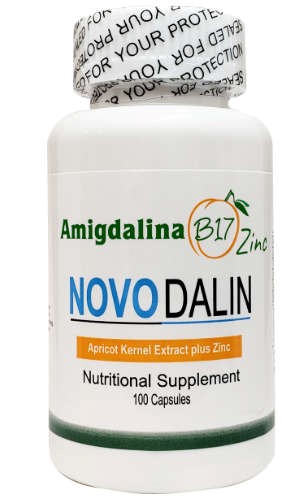COVID-19: On behalf of Novodalin, we wanted to thank you for your loyalty. Please note that for the moment you may receive your 500mg and the 100mg Amygdalin Tablets in a different type of bottle. This measure is only temporaly. More Details.
Novodalin Amygdalin Plus Zinc Capsules

Each Novodalin Amygdalin Plus Zinc Capsule Contains:
| Amygdalin | 450 mg |
| Zinc sulfate | 36 mg |
Amygdalin: Our active ingredient, it is pure Vitamin B17 extracted from Apricot Kernels (P. Armeniaca) with a purity of 99.5% it is a very stable compound with a melting point of 200°C - 220°C, pH in saturated water solution about 7.
Zinc: Zinc is a mineral needed to fight bacteria and viruses, it makes the genetic material DNA, its an essential nutrient for higher animals and plants In recent studies it has been shown that zinc is the transportation mechanism of Vitamin B17 in the body and that the potency of Amygdalin treatment increases significantly by the addition of zinc.
| Serving Size 1 Vegetarian Capsule | Serving per container: 100 | |
| Amount per serving | %DV | |
| Calories | 11.2 g | * |
| Total carbohydrates | 0.017 g | * |
| Protein | 0.100 g | * |
| Lipids | 0.245 g | * |
| Sodium | 0 g | * |
* Percent daily value (DV) based on a 2000 calorie diet.
Apricot sweet and bitter almonds.
Why bitter is better.
The origins of Apricot (Prunus Armeniaca) included in the genus Prunus in the subfamily Prunoideae in the family Rosaceae are the Central Asia, Western Asia, Iran and Caucasus. Apricot is quite a valuable fruit that can be processed into numerous different products. Not only apricot is consumed in fresh and dried forms throughout the year, but also the seeds of its kernels are utilized in various ways.
The bitter almond is slightly broader and shorter than the sweet almond, and contains about 50% of the fixed oil that occurs in sweet almonds.
Cooking oil, benzaldehyde, activated carbon, amygdalin and hydrocyanic acid are obtained from the seeds of apricot. The apricot kernels that are sweet are consumed as dried fruits, whereas those that are bitter are used as raw materials in cosmetic and pharmaceutical industries.
Known as a cyanogenic glycoside, amygdalin, D(-)-mandelonitrile -gentobioside, is found abundantly in many tissues, and especially seeds of species Prunus.
Apricot seeds contain various amounts of amygdalin depending on cultivars. It is reported that bitter contain higher amygdalin that sweet cultivars (Gomez et al., 1998). Femenia et al(1995) reported that a high amount of amygdalin
was found in bitter aprico cultivars, but not in seeds of sweet ones.
These differences in amygdalin content are considered to be due to the differences in the harvest time when the fruit was collected. As a matter of fact, Frehner et al. (1990) reported that the cyanogenic content of seeds might vary significantly throughout maturation and that an increase occurred with maturation in almond seeds.
The conclusion was that seeds of bitter cultivars contained quite a high level of amygdalin than seeds of sweet cultivars, in this case Paviot and Karacabey contained the highest amygdalin content among all apricot cultivars.